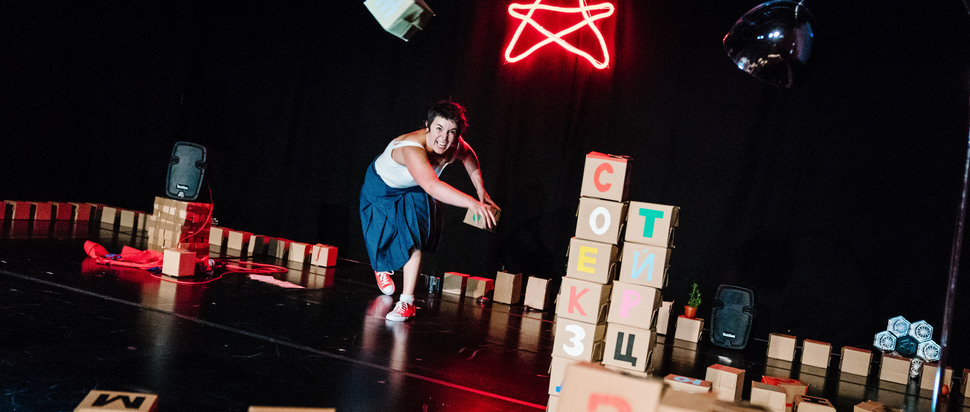Katherina Radeva on Fallen Fruit
Katherina Radeva first wrote Fallen Fruit, a solo show about her childhood in Communist Bulgaria, ten years ago. Now, as the show tours the UK, she tells us why it felt like the right time to revisit it
"On 9 November 1989, everything that was happening in Berlin was broadcast on Bulgarian National Television," Katherina Radeva, the Bulgarian-born theatremaker, artist and set designer, tells us of her memories from the the day the Berlin Wall fell.
"We watched it all," she continues. "The following day, I was with my mum and dad on the streets, taking part in these giant protests." The protests were violent, but they "didn't feel that way" to the then seven-year-old Radeva. "Looking back, I'm like 'bloody hell' – that was proper violence," she says. “But how I experienced it was as another beginning, another opportunity. I was born under the same dictatorship my parents were born under – overruling that was a massive point of jubilation,” she pauses. “It was an absolutely brilliant, fucking amazing party – still the best one I’ve ever been to.”
But no party lasts forever. The years following the fall were tough: “When a massive system stops, everything stops,” Radeva says of growing up in Bulgaria in the early 90s. “There was famine... the run-up was massively beautiful and positive. But when it happened – the feeling was, 'what now?'”
Fallen Fruit – Radeva’s solo show – revisits this period of history and her life. The work is rooted in her “childhood memories” of the era. Writing it was the first time she became “really aware” of the disconnect between Soviet and Western societies. “The actual fall of the Berlin Wall was broadcast in Western media, but what life was actually like between 1945 and 1989 definitely wasn’t,” she says. “It was a mystery on both sides.” Depicting it through the eyes of a child was useful in terms of connecting the experience with Western audiences: “everybody relates to the idea that we want the best for any kid in the world, at any point in time.”
Radeva first wrote the play ten years ago, prompted by the 20th anniversary of the fall of the Wall. In 2018, she felt compelled to return to it. “Alister [Lownie, her creative partner, and the other half of her theatre company, Two Destination Language] and I reread it, and immediately felt that it was so relevant,” she says. The show struck them as having the potential to “open up a conversation” in a new, politically polarised context in the UK, specifically in the wake of the Brexit vote.
Radeva got to work rewriting Fallen Fruit, keeping the foundation the same, but weaving her memories of a childhood under communism with her experiences as a Bulgarian woman in Brexit Britain. The revised version includes, for example, an interactive game show where she “gently pushes on notions of politics... it's a very fun, innocent game which is also, in many ways, the most political tool of the work.”
The “most fundamental” difference this time around, though, is the emphasis on “dialogue with the audience after the show.” Radeva stresses how valuable these conversations have been so far on the tour, and mentions that the audiences have been diverse, with different opinions on Europe. She thinks that the most important thing we can do now is simply to listen to each other, and is excited by the potential of theatre and live art to break down the metaphorical walls that block free communication. “Sometimes [the post-show dialogue] is longer than the bloody show!” she proudly tells us.
What’s the value of art in a world that feels increasingly polarised and extreme? “Nobody likes being told how to think,” Radeva says. Art is about “trying to find the access point – the crack in someone’s thinking – to actually get through to them in a non-threatening way. After that, we’re more likely to have a better conversation.” As an artist whose earliest years were spent in a carefully controlled cultural landscape, she’s arguably got more insight into the power of creative expression than most. She wryly tells us: “The most dangerous thing for any political regime is someone having a bright idea, and people getting behind it.”
Fallen Fruit runs at Paisley Arts Centre, Paisley, 1 Nov; Aros Community Theatre, Skye, 2 Nov; Universal Hall, Findhorn, 6 Nov; Lyth Arts Centre, Wick, 7 Nov; The Barn, Aberdeenshire, 8 Nov; Eden Court, Inverness, 9 Nov; Perth Theatre, Perth, 10 Nov
